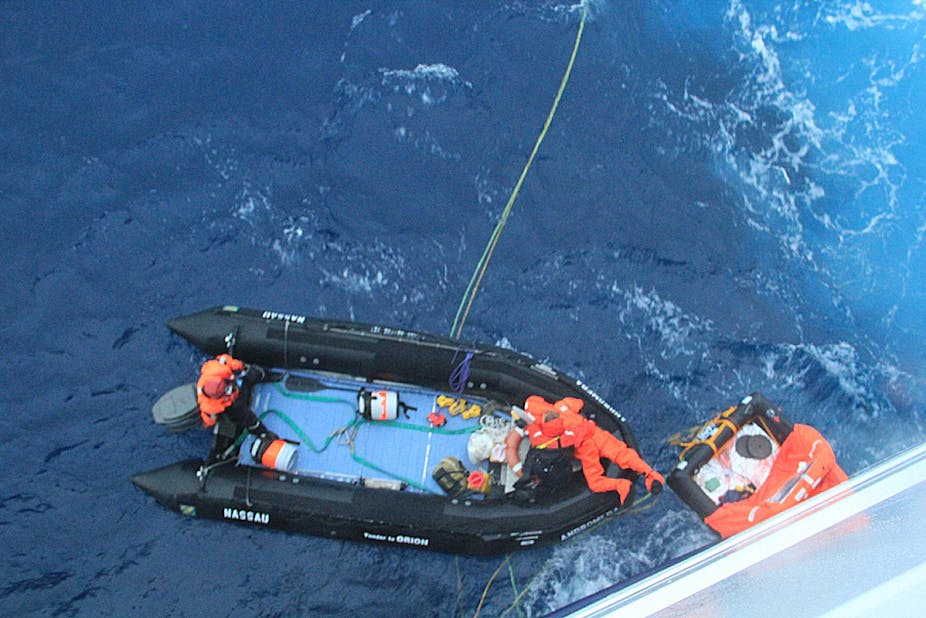Passengers aboard the cruise ship Orion, which recently rescued French sailor Alain Delord in the seas southwest of Hobart, were at first upset that they had to detour from their planned route. They were on course for Macquarie Island and the diversion to attempt to rescue the stricken sailor was going to take them more than 50 hours off course.
But finding they had the chance to save someone’s life put their situation in perspective, and many passengers later spoke of being compelled to help when faced with the opportunity to save someone’s life. Indeed the Orion’s Captain, Mike Taylor, reported cheers throughout the ship when Alain Delord was eventually pulled on board.
So close to Australia Day it is great to witness such an example of the national spirit on display. A tiny capsized boat holding one person who has been adrift for days in open waters, brings out the best of our ability to go out of our way to help someone in distress. It’s the same spirit we see nightly on our news as many communities face bush fires. Irrespective of language, nationality and inconvenience, the chance to do something good prevails. Mr Delord described his rescue as a “miracle”; one that gave him “a second chance at life”.
Contrast this recent scene of rescue at sea with the hostility displayed last year towards asylum seekers arriving by boat . As asylum seekers arrived by boat seeking safety, politicians competed to seem tougher on border security and harsh detention regimes were re-established on Nauru and Manus Island.
As the issue of boat arrivals reached fever pitch with an Expert Panel inquiry announced (and The Conversation’s own expert panel launched), it became harder and harder to convey the story of asylum seekers as people seeking a miracle as they boarded boats in the hope that Australia would provide them with their own second chance at life.
So what is the difference between Alain Delord’s story and the story of so many asylum seekers?
For me, it the personalisation of the story - the fact that we can attach a face and name to Delord, when asylum seekers largely remain nameless and faceless. Part of this is due to efforts of the Department of Immigration and Citizenship to deliberately de-humanise asylum seekers. Why else do we call the boats “SIEV” (Suspected Irregular Entry Vessel) and the people on them “IMAs” (Irregular Maritime Arrival)? In a sea of legal labels and confusing acronyms, individual stories and personal details are obscured.
For too long, we’ve been led by politicians telling us how to think about the issue of asylum seekers. Cameras are not allowed into detention centres and once released from detention, many refugees fear that telling their stories might harm the situation of their families in their countries of origin. Confidentiality and anonymity can safeguard their life.
Many asylum seekers do want to tell their stories. For example the Voiceless Journeys photo project, Refugees’ Australian Stories, Amnesty International’s Re-think refugees campaign and the Between the Devil and the Deep Blue Sea film each present different sides and faces of this very complex tale. And if you are in need of more summer reading, Ali Al-Jenabi’s harrowing tale of exile and displacement is told in Robin de Crespigny’s award-winning book “The People Smuggler”.
Some asylum seekers’ stories go on to become stories that we celebrate on Australia Day. Take for instance one of the finalists for Young Australian of the Year, Akram Azimi. Akram arrived as a refugee from Afghanistan as a teenager and he has used his second chance in Australia to support and mentor Indigenous communities in Western Australia. These stories are out there waiting to be heard.
As we approach the Australia Day long weekend at the end of January, I’m not sure if it is too late for new year’s resolutions. One possible resolution for 2013, an election year where asylum seekers are undoubtedly going to generate more political debate, is to start making up our own minds about asylum seekers.
Beyond IMAs, “illegals” and “boat people” are men, women and children who have faced arduous journeys. Asylum seekers are in need of rescue and we can help them. Wouldn’t it be nice if just once we could read a quote from the Australian Maritime Safety Authority, having found asylum seekers at sea, that says, “It was a challenging rescue operation, but Mohammed and his family needed our assistance and we can give them a chance at a better life”?

